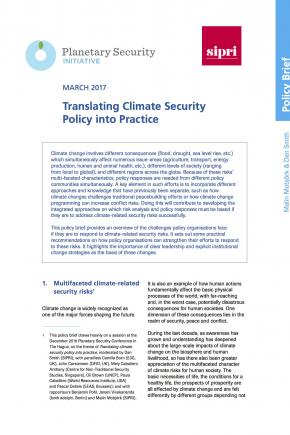Translating Climate Security Policy into Practice
Climate change involves different consequences (flood, drought, sea level rise, etc.) which simultaneously affect numerous issue-areas (agriculture, transport, energy production, human and animal health, etc.), different levels of society (ranging from local to global), and different regions across the globe. Because of these risks’ multi-faceted characteristics, policy responses are needed from different policy communities simultaneously.
A key element in such efforts is to incorporate different approaches and knowledge that have previously been separate, such as how climate changes challenges traditional peacebuilding efforts or how climate change programming can increase conflict risks. Doing this will contribute to developing the integrated approaches on which risk analysis and policy responses must be based if they are to address climate-related security risks successfully.
This policy brief provides an overview of the challenges policy organizations face if they are to respond to climate-related security risks. It sets out some practical recommendations on how policy organizations can strengthen their efforts to respond to these risks. It highlights the importance of clear leadership and explicit institutional change strategies as the basis of these changes.


